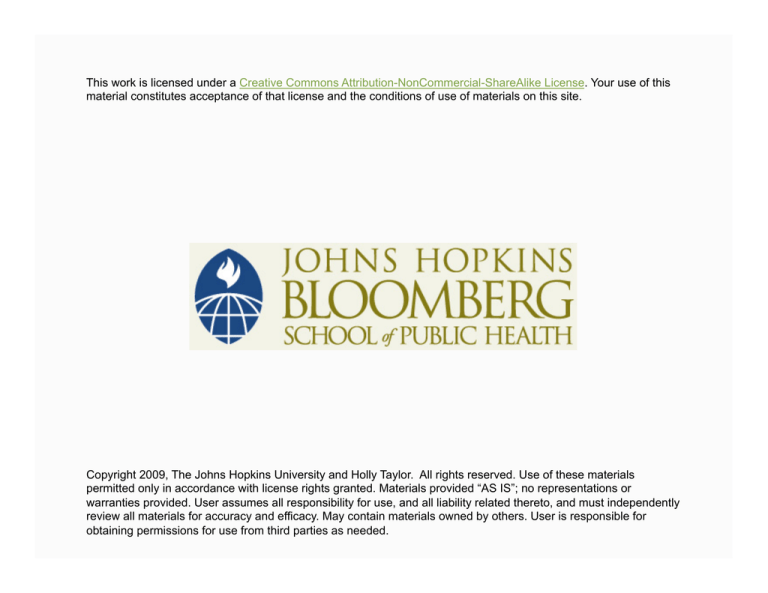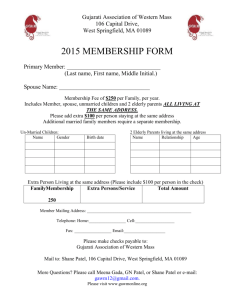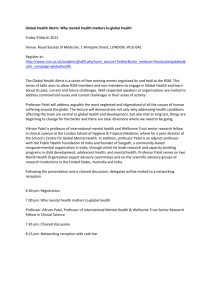
This work is licensed under a Creative Commons Attribution-NonCommercial-ShareAlike License. Your use of this
material constitutes acceptance of that license and the conditions of use of materials on this site.
Copyright 2009, The Johns Hopkins University and Holly Taylor. All rights reserved. Use of these materials
permitted only in accordance with license rights granted. Materials provided “AS IS”; no representations or
warranties provided. User assumes all responsibility for use, and all liability related thereto, and must independently
review all materials for accuracy and efficacy. May contain materials owned by others. User is responsible for
obtaining permissions for use from third parties as needed.
Section C
Case, Application of Framework Part 1
Overview
Review case
Apply framework to the case
3
Case
Dr. Patel is a medical oncologist in private practice. She is
collaborating with other colleagues on a clinical trial of a novel
breast cancer regimen. Dr. Patel explains the availability of the trial
to a long-time patient and prospective subject, Mrs. Singh. Dr. Patel
explains how in this trial Mrs. Singh will be randomized to receive
standard treatment for her breast cancer or a novel breast cancer
regimen. The novel regimen has been shown to be effective in the
U.S. but has not yet been tested in India.
Note: Based on case 4.3 in Murphy, Timothy. (2004). Case
studies in biomedical research ethics. Boston: MIT Press.
4
Case
Dr. Patel describes the study procedures to Mrs. Singh. She reviews
with Mrs. Singh the procedures that she will undergo that are the
same as those she would undergo if she was not enrolled in the trial
and the extra procedures she will undergo if she joins the trial
(e.g., extra blood draws, scans). Dr. Patel adds that during the
length of the trial, study-related costs (i.e., procedures and
medications) will be covered by the trial sponsor. The sponsor will
also reimburse Mrs. Singh for the incidental expenses related to her
participation (e.g., local transport by taxi, lunch).
Note: Based on case 4.3 in Murphy, Timothy. (2004). Case
studies in biomedical research ethics. Boston: MIT Press.
5
Case
Dr. Patel will receive Rs 100,000 for each patient she enrolls. These
funds will pay additional staff hired to coordinate the identification
and enrollment of eligible patients, will cover follow-up, and will
provide Dr. Patel with an incentive to enroll patients in the study.
Mrs. Singh provides her informed consent to enroll in the study.
Note: Based on case 4.3 in Murphy, Timothy. (2004). Case
studies in biomedical research ethics. Boston: MIT Press.
6
Application of the Framework
Review the facts of the case
- Dr. Patel participating in trial
- Mrs. Singh is a patient of Dr. Patel
- Dr. Patel approaches Mrs. Singh about enrollment in an RCT
- Novel treatment under study has been found effective in U.S.
trials
- Sponsor covering patient and physician study-related costs
- Mrs. Singh provides her consent to enroll
7
Framework: Concerns/Challenges
Identify the potential moral concerns, or challenges raised by the
case
- Physician-investigator
- Patient
- Study design
8
Concerns/Challenges Regarding the Physician-Investigator
Identify the potential moral concerns or challenges raised by the
case
- Physician-investigator
Role, responsibility
- Physician/investigator-patient relationship
- Respect for persons
Conflict of interest?
- Financial gain?
- Incentive to enroll patients?
9
Concerns/Challenges Regarding the Patient
Identify the potential moral concerns or challenges raised by the
case
- Patient
Enrollment in hope of medical benefit?
- Offer enrollment affirmation by physician
Enrollment to defer costs of care?
Pressure to enroll given relationship with physician?
- Enrolls with idea to please physician
- Enrolls to avoid negative effect on care
Availability of treatment after trial is completed
10
Concerns/Challenges Regarding the Study Design
Identify the potential moral concerns, or challenges raised by the
case
- Study design
Conflict of interest
- Best interest of patient vs. best interest of future
patients
Permissible to conduct an RCT when treatment found to be
effective in U.S.
11
Framework: Principles/Requirements
Which ethical principles/requirements are associated with each
moral concern, challenge raised?
- Principles/requirements meant to remind user of range of issues
that might be relevant
12
Principles/Requirements for the Physician-Investigator
Physician-investigator
Principle/requirement
Integrity/responsibility
Professional competence
Regulatory compliance
Role responsibility
Beneficence
Precaution and risk minimization
Scientific validity
Justice
Fair selection of study population
• Protection of vulnerable populations
Respect for persons
Voluntariness
13
Principles/Requirements for the Physician-Investigator
Physician-investigator
Conflict of interest
Principle/requirement
Integrity/responsibility
Accountability and transparency
14
Principles/Requirements for the Patient
Patient
Principle/requirement
Beneficence
Precaution and risk minimization
Enrollment in hope of
benefit
Respect for persons
Voluntariness
Integrity/responsibility
Accountability and transparency
• Independent ethics review
Enrollment to defer
costs
Respect for persons
Voluntariness
15
Principles/Requirements for the Patient
Patient
Principle/requirement
Pressure to enroll
Respect for persons
Voluntariness
Availability of
treatment after trial
Respect for persons
Post-trial access to beneficial
interventions
16
Principles/Requirements for the Study Design
Study design
Conflict of interest
Principle/requirement
Beneficence
Precaution and risk minimization
Beneficence
Scientific validity
Favorable risk-benefit ratio
OK to conduct RCT?
Integrity/responsibility
Accountability and transparency
• Independent ethics review
17





